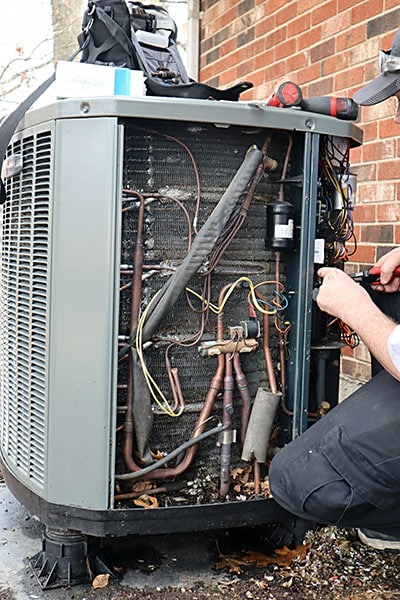4 Ways to Handle a Damaged HVAC Capacitor

The HVAC system in your Palm Desert, CA home has energy demands that regularly exceed your electrical system’s output. To overcome this, each of its motors has its own capacitor. HVAC capacitors use electromagnetic energy fields to store energy up and then supply it in one tremendous boost. They also regulate energy delivery throughout heating and cooling cycles to keep furnaces and air conditioners running smoothly. If one or more of your HVAC capacitors ever stops working, the following are four things that you can do.
1. Look for the Symptoms
Hardwired directly into your home’s electrical system, HVAC capacitors aren’t safe to troubleshoot or repair without the proper training and experience. Unfortunately, if your capacitor goes out, there’s very little that you can do to safely resolve the problem on your own.
Moreover, given that do-it-yourself capacitor repairs would require you to open the service panel and tamper with important components, tackling this job yourself could void your HVAC manufacturer’s warranty. It can also void any HVAC system protections provided by your home insurance policy and your home service agreement.
However, you can make an educated guess whether this is where your problem lies. Your might have a bad or broken capacitor if your HVAC system:
- Fails to turn on
- Repeatedly shuts itself down
- Works but doesn’t move heated or cooled air
- Costs a lot more to use than it did before
HVAC systems with failed capacitors also make loud buzzing or humming sounds during operation. To check for these, simply turn your televisions and other noise-generating devices and appliances off, turn your HVAC system on, and listen carefully. If your heating and cooling equipment is suddenly far louder than it was in years past, it may have capacitor problems.
2. Have Your HVAC Capacitor Replaced
Choosing a replacement capacitor is a complex endeavor. You’d need to select the right voltage and microfarad ratings to avoid electrical hazards and ongoing functional problems. At the risk of electrocution, you’d also have to install this component correctly. To ensure the safety of everyone in your home and to protect the life spans of your electrical and HVAC systems, have your damaged capacitor professionally diagnosed and replaced. Most HVAC capacitors need replacement every 10 years or fewer.
3. Upgrade Your Start-Up and Run Capacitors to Dual Capacitors
Your HVAC system’s compressor, blower, and outdoor fan motors might have one capacitor or two. Motors that have two capacitors have start-up capacitors and run capacitors. Just as their names imply, start-up capacitors provide the initial boost of energy that motors need to get going, and run capacitors supply the steady and greatly reduced stream of electricity that’s necessary to keep them running.
Unfortunately, although their life spans are comparable, start and run capacitors aren’t guaranteed to fail at the same time. If you have motors with two capacitors and only one of these components fails, consider having a dual capacitor put in. A dual capacitor can handle both jobs. It will also eliminate the need to replace the other, still-functioning, capacitor just a bit further down the road.
4. Invest in Surge Protection
Start, run, and dual capacitors have tough jobs. As such, time and general wear are invariably factors in their eventual demise. However, overheating and power surges both shorten the lifespans of these components as well. More importantly, these are risk factors for capacitor failure that you can actually mitigate.
Installing whole-house surge protection will protect your HVAC capacitors from major power surges. For instance, each time your power goes out, whether due to severe weather or disruptions in your utility service, more voltage than your electrical system can handle comes surging through your wires once power is restored. Surge protection diverts this power so that your appliances, outlets, wiring, and HVAC capacitors aren’t harmed. Surge protection will also protect your electrical system and electronics from the many miniature power surges that regularly occur due to fluctuations in the electricity supply from your utility company.
To prevent problems with overheating that might damage your HVAC capacitors, make sure that your furnace and air conditioner are properly sized for your home. Change their air filters every 30 to 60 days, and have them serviced by a licensed HVAC company annually.
Since 1980, our team at Breeze Air Conditioning has been proudly serving Palm Desert, CA and the surrounding communities. We offer superior heating, cooling, and indoor air quality services. To find out about our preventative maintenance program or to schedule an appointment, get in touch with us today!
Tags: HVAC Repair